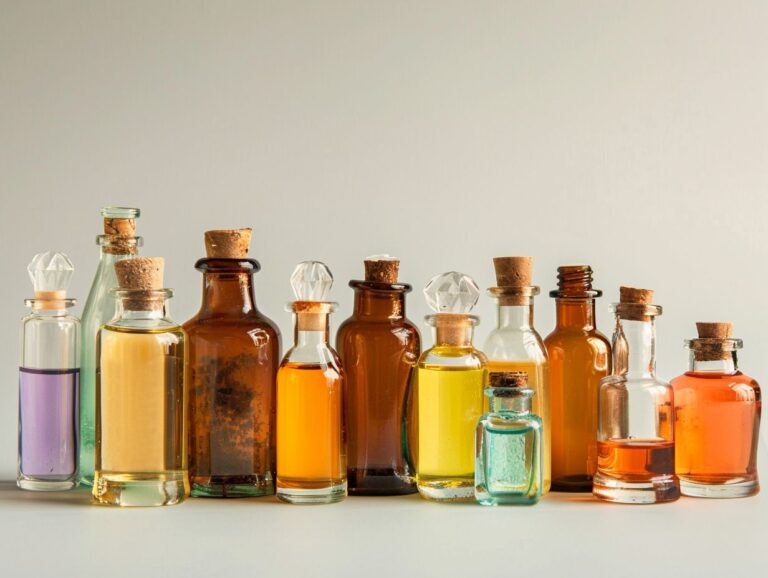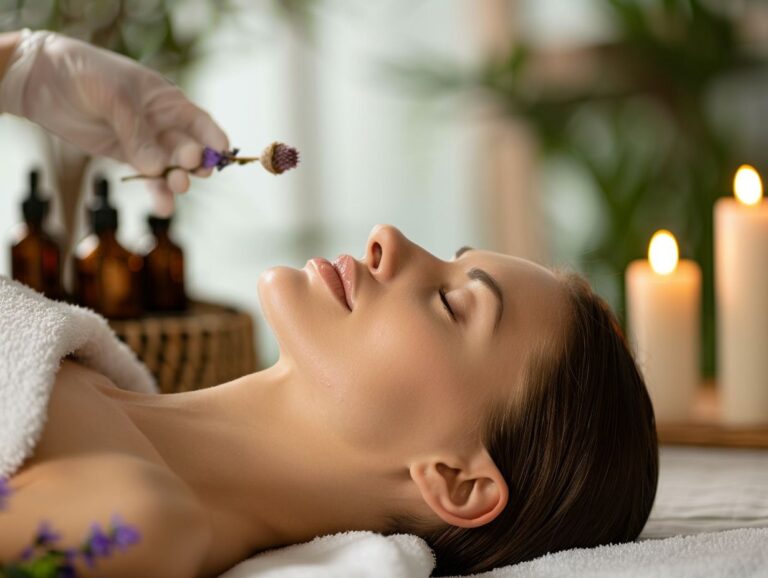Do Aromatherapy Oils Really Work
Aromatherapy has been gaining popularity for its potential health benefits. This article explores how aromatherapy works, what aromatherapy oils are, and how they are made.
We discuss the most common oils used in aromatherapy, their benefits, and any scientific evidence supporting their effectiveness.
Learn about how to use aromatherapy oils safely, possible side effects, interactions with medications, and associated risks. Explore the world of aromatherapy oils!
Key Takeaways:
What Is Aromatherapy?
Aromatherapy is a holistic healing treatment that uses plant extracts, known as essential oils, to promote health and well-being. These essential oils are derived from various plants and have been utilized for centuries in traditional medicine practices.
Aromatherapy has its roots in ancient civilizations like Egypt, Greece, and China. The Egyptians used aromatic plants for religious rituals, embalming, and medicinal purposes. Greeks like Hippocrates believed in the healing properties of aromatic plants, laying the foundation for the concept of using scents to heal. Chinese traditional medicine incorporated aromatic substances to balance energy flow and treat ailments.
The practice of aromatherapy revolves around the principle that inhaling the aroma of essential oils stimulates the limbic system, which is linked to emotions, behavior, memory, and the autonomic nervous system. These oils can be applied topically, inhaled, or used in massages to impact physical, emotional, and mental well-being.
How Does Aromatherapy Work?
Aromatherapy works by stimulating the smell receptors in the nose, which then send messages through the nervous system to the limbic system – the part of the brain that controls emotions. This process triggers the release of chemicals that provide various health benefits such as relaxation, stress relief, and improved mood.
The essential oils used in aromatherapy contain volatile aromatic compounds that interact with the olfactory nerves when inhaled. Once these compounds are inhaled, they travel through the olfactory system to the limbic system, which plays a crucial role in regulating emotions and memory. By directly influencing this area, essential oils have the ability to promote feelings of calmness, reduce anxiety, and evoke positive emotions.
What Are Aromatherapy Oils?
Aromatherapy oils are concentrated plant extracts that capture the natural scents and properties of the source plant. These oils are the core components used in aromatherapy practices and are essential for reaping the benefits associated with this holistic healing approach.
One of the key characteristics of how fast does aromatherapy work oils is their method of extraction, which can vary depending on the plant. Common extraction methods include steam distillation, cold pressing, solvent extraction, and enfleurage.
Each method preserves different components of the plant, resulting in oils with unique therapeutic properties. Their diversity extends to the wide range of plant sources, such as the science of aromatherapy, each offering distinct benefits.
Aromatherapy oils are used in various aromatherapy techniques, including inhalation, topical application, and diffusion, allowing individuals to experience their healing effects in different ways.
How Are Aromatherapy Oils Made?
Aromatherapy oils are typically made through the process of distillation or cold pressing, depending on the plant material used. These methods help extract the potent plant essences while preserving their therapeutic properties. Numerous studies have been conducted to understand the efficacy and benefits of different aromatherapy oils.
During distillation, steam is used to purify and concentrate the essential oils, separating them from the water content of the plant. This method is commonly used for extracting oils from flowers, leaves, and stems. On the other hand, cold pressing involves mechanically squeezing the oils out of the plant material without using heat, especially suitable for fruits and rinds.
Research has shown that essential oils can have various health benefits, such as stress relief, improved sleep, and even some antimicrobial properties. For instance, lavender oil has been proven to reduce anxiety levels and promote relaxation.
What Are the Most Common Aromatherapy Oils?

Lavender oil is renowned for its calming effect, making it ideal for relieving stress and promoting relaxation.
Tea tree oil is known for its antibacterial and antifungal properties, making it a popular choice for treating skin conditions. Learn if aromatherapy bracelets work too.
Peppermint oil is often used to boost energy and improve focus.
Eucalyptus oil is valued for its decongestant properties, perfect for respiratory issues.
Lemon oil is refreshing and uplifting, promoting a positive mood.
Lemongrass oil is great for reducing inflammation and muscle pain.
Orange oil is bright and cheerful, often used to uplift and energize the mind.
Do Aromatherapy Oils Really Work?
The efficacy of aromatherapy oils has been supported by research studies that have demonstrated their potential health benefits and therapeutic effects. These studies have shown proven success in utilizing essential oils for various purposes, ranging from stress relief to skin care.
One particular area where the effectiveness of aromatherapy oils has been extensively researched is in reducing anxiety and promoting relaxation. A study published in the Journal of Alternative and Complementary Medicine found that inhaling lavender essential oil significantly decreased levels of stress and anxiety in participants.
Furthermore, aromatherapy oils have been found to have antibacterial and antiviral properties. Research conducted at The Ohio State University demonstrated that certain essential oils can effectively combat harmful bacteria and viruses, making them valuable for supporting overall immune health.
What Are the Benefits of Aromatherapy Oils?
Aromatherapy oils offer a wide range of health benefits, including stress relief, relaxation, improved sleep quality, mood enhancement, and even potential skin benefits. These oils are known for their holistic healing properties and have been used to address various physical and emotional ailments.
Furthermore,
- Aromatherapy oils are not only beneficial for the mind and soul but also for the body. They can help alleviate headaches, muscular pain, and even digestive issues.
- The therapeutic scents of these oils can also aid in boosting concentration, reducing anxiety, and promoting overall well-being.
- Additionally, aromatherapy oils have antibacterial and antiviral properties, making them useful in supporting the immune system and warding off illnesses.
Is There Scientific Evidence to Support the Effectiveness of Aromatherapy Oils?
Numerous research studies, including those conducted by the National Institute of Health, have provided scientific evidence supporting the effectiveness of aromatherapy oils in promoting health and well-being. These studies have shed light on the mechanisms through which essential oils exert their beneficial effects.
One intriguing aspect of the research is the impact of aromatherapy oils on mental health. Studies have shown that certain essential oils, such as lavender and bergamot, can help reduce anxiety and improve mood. The inhalation of these oils has been found to stimulate the limbic system, which plays a critical role in emotions and memory. Research suggests that essential oils like peppermint and eucalyptus possess antimicrobial properties, aiding in warding off pathogens. Such findings highlight the versatile nature of aromatherapy oils in supporting both physical and emotional well-being.
How to Use Aromatherapy Oils?
There are various methods to use aromatherapy oils, including inhalation through diffusers, topical application in diluted forms, and even through scented candles. Each method offers unique benefits and applications based on individual preferences and desired outcomes.
For inhalation, using a diffuser is a popular choice as it disperses the aroma throughout a room, creating a calming or energizing atmosphere. Topical application involves blending essential oils with carrier oils for massage or applying to pulse points for a more targeted effect.
Scented candles infused with essential oils can enhance relaxation during meditation or yoga sessions. Aromatherapy oils can also be added to baths, allowing for a soothing and rejuvenating experience to uplift the mood after a long day.
What Are the Different Methods of Using Aromatherapy Oils?

Diffusion is a popular method that involves dispersing essential oils into the air. This can be done through various devices like ultrasonic diffusers, nebulizing diffusers, or even simple reed diffusers. The inhalation of these aromatic molecules can promote relaxation, improve mood, or even help with respiratory issues.
Topical application involves diluting essential oils with a carrier oil and applying the mixture directly to the skin. This method is commonly used for massages, skincare, and localized pain relief. It allows the oils to be absorbed through the skin, offering targeted benefits, to see if bath body aromatherapy works
Direct inhalation entails inhaling the aroma of essential oils either through cupping the hands over the nose and mouth or using a diffuser necklace. This method can help with emotional support, stress relief, and mental clarity.
Are There Any Safety Precautions to Consider When Using Aromatherapy Oils?
When using aromatherapy oils, it is essential to consider safety precautions to prevent adverse reactions or misuse. Following proper dilution guidelines, understanding contraindications, and ensuring the quality and purity of essential oils are crucial steps in maintaining safety.
Proper dilution guidelines are crucial to prevent skin irritations or sensitivities that may arise from using undiluted essential oils directly on the skin. It is recommended to use a carrier oil such as jojoba or coconut oil to dilute essential oils before applying them topically.
Understanding contraindications is vital as certain essential oils can interact with medications or exacerbate health conditions. For instance, pregnant women should avoid certain oils like clary sage or juniper berry. Always consult a qualified aromatherapist or healthcare provider before using essential oils, especially if you have any existing health concerns.
What Are the Possible Side Effects of Aromatherapy Oils?
While aromatherapy oils offer a range of benefits, there are potential side effects that users should be aware of. These may include skin irritation, allergic reactions, respiratory issues, and sensitivities to certain oils. Understanding and recognizing these side effects is fundamental for safe and effective use of essential oils.
It is essential to conduct a patch test before using any new essential oil, especially if you have sensitive skin. This simple step can help identify any potential allergic reactions or skin irritations before widespread use. Furthermore, proper dilution is crucial to prevent skin irritation, as undiluted essential oils can be too strong for direct application. Following recommended dilution ratios outlined by reputable sources can minimize the risk of adverse effects.
Can Aromatherapy Oils Interact with Medications?
It is crucial to consult a medical professional or healthcare provider before using aromatherapy oils, especially if you are taking medications. Some essential oils can interact with certain medications, affecting their efficacy or causing unwanted side effects.
Seeking professional advice is essential as certain aromatherapy oils may interfere with the way medications work in your body. Consulting a healthcare provider can help determine the potential risks and benefits of combining aromatherapy with your current medication regimen. This proactive approach can prevent any harmful interactions and ensure your well-being. Remember, each individual reacts differently to substances, so personalized guidance is key in integrating aromatherapy safely into your health routine.
Are There Any Risks Associated with Using Aromatherapy Oils?
While aromatherapy oils offer numerous benefits, there are inherent risks associated with their usage, including skin sensitivities, allergic reactions, and interactions with medications. It is essential to be aware of these risks and take necessary precautions when incorporating essential oils into your wellness routine.
One key consideration when using essential oils is to always dilute them properly with a carrier oil to prevent skin irritation or burns.
Certain essential oils can be harmful if ingested, so it is crucial to keep them out of reach of children and pets.
Pregnant women, individuals with certain medical conditions, or those on specific medications should consult a healthcare professional before using aromatherapy oils to avoid adverse reactions or contraindications.
Conclusion

Aromatherapy with essential oils is a versatile and holistic approach to enhancing overall well-being. The proven benefits of aromatherapy oils, coupled with scientific research supporting their efficacy, highlight their potential for promoting mental, emotional, and physical health.
Essential oils are extracted from plants, flowers, or trees, and their therapeutic properties have been utilized for centuries. These oils can be inhaled, applied topically, or used in diffusers to create a calming atmosphere. Lavender, peppermint, and eucalyptus are popular oils known for their calming, uplifting, and invigorating effects, respectively. Incorporating aromatherapy necklaces work into daily routines can reduce stress, improve sleep quality, and enhance relaxation. The practice of aromatherapy aligns w#Tithe principles of holistic wellness, focusing on the interconnectedness of the mind, body, and spirit.”
Frequently Asked Questions
Do Aromatherapy Oils Really Work?
Yes, aromatherapy oils have been used for centuries for their therapeutic properties and have been shown to have various physical and psychological benefits.
What Are Aromatherapy Oils?
Aromatherapy oils are concentrated liquids extracted from plants, flowers, and herbs that are used in aromatherapy for their healing and therapeutic properties.
How Do Aromatherapy Oils Work?
Aromatherapy oils work by stimulating the olfactory system (sense of smell) and triggering the release of certain chemicals in the brain, which can have a positive effect on physical and emotional well-being.
What Are Some Popular Aromatherapy Oils?
Some popular aromatherapy oils include lavender, peppermint, eucalyptus, tea tree, and lemon. Each oil has its own unique properties and benefits.
What Are the Benefits of Aromatherapy Oils?
The benefits of aromatherapy oils vary depending on the type of oil used, but they can include improving mood, reducing anxiety and stress, relieving pain and inflammation, and promoting relaxation and sleep.
Are There Any Risks or Side Effects of Using Aromatherapy Oils?
While aromatherapy oils are generally considered safe, they can cause allergic reactions or skin irritation in some individuals. It’s always best to do a patch test and dilute the oil before use to avoid any potential risks or side effects.








4 Comments